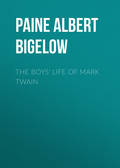
Paine Albert Bigelow
Mark Twain: A Biography. Volume II, Part 2: 1886-1900
CCIX
PLASMON, AND A NEW MAGAZINE
Clemens was not wholly wedded to osteopathy. The financial interest which he had taken in the new milk albumen, "a food for invalids," tended to divide his faith and make him uncertain as to which was to be the chief panacea for all ills—osteopathy or plasmon.
MacAlister, who was deeply interested in the plasmon fortunes, was anxious to get the product adopted by the army. He believed, if he could get an interview with the Medical Director-General, he could convince him of its merits. Discussing the matter with Clemens, the latter said:
"MacAlister, you are going at it from the wrong end. You can't go direct to that man, a perfect stranger, and convince him of anything. Who is his nearest friend?"
MacAlister knew a man on terms of social intimacy with the official.
Clemens said, "That is the man to speak to the Director-General."
"But I don't know him, either," said MacAlister.
"Very good. Do you know any one who does know him?"
"Yes, I know his most intimate friend."
"Then he is the man for you to approach. Convince him that plasmon is what the army needs, that the military hospitals are suffering for it.
Let him understand that what you want is to get this to the Director-General, and in due time it will get to him in the proper way.
You'll see."
This proved to be a true prophecy. It was only a little while until the British army had experimented with plasmon and adopted it. MacAlister reported the success of the scheme to Clemens, and out of it grew the story entitled, "Two Little Tales," published in November of the following year (1901) in the Century Magazine. Perhaps the reader will remember that in the "Two Little Tales" the Emperor is very ill and the lowest of all his subjects knows a certain remedy, but he cannot seek the Emperor direct, so he wisely approaches him through a series of progressive stages—finally reaching and curing his stricken Majesty.
Clemens had the courage of his investments. He adopted plasmon as his own daily food, and induced various members of the family to take it in its more palatable forms, one of these being a preparation of chocolate. He kept the reading-table by his bed well stocked with a variety of the products and invited various callers to try a complimentary sample lot. It was really an excellent and harmless diet, and both the company and its patients would seem to have prospered—perhaps are prospering still.
There was another business opportunity came along just at this time. S. S. McClure was in England with a proposition for starting a new magazine whose complexion was to be peculiarly American, with Mark Twain as its editor. The magazine was to be called 'The Universal', and by the proposition Clemens was to receive a tenth interest in it for his first year's work, and an added twentieth interest for each of the two succeeding years, with a guarantee that his shares should not earn him less than five thousand dollars the first year, with a proportionate increase as his holdings grew.
The scheme appealed to Clemens, it being understood in the beginning that he was to give very little time to the work, with the privilege of doing it at his home, wherever that might happen to be. He wrote of the matter to Mr. Rogers, explaining in detail, and Rogers replied, approving the plan. Mr. Rogers said he knew that he [Rogers] would have to do most of the work in editing the magazine, and further added:
One thing I shall insist upon, however, if I have anything to do with the matter, and it is this: that when you have made up your mind on the subject you will stick to it. I have not found in your composition that element of stubbornness which is a constant source of embarrassment to me in all friendly and social ways, but which, when applied to certain lines of business, brings in the dollar and fifty-cent pieces. If you accept the position, of course that means that you have to come to this country. If you do, the yachting will be a success.
There was considerable correspondence with McClure over the new periodical. In one letter Clemens set forth his general views of the matter quite clearly:
Let us not deceive any one, nor allow any one to deceive himself, if it can be prevented. This is not to be comic magazine. It is to be simply a good, clean, wholesome collection of well-written & enticing literary products, like the other magazines of its class; not setting itself to please but one of man's moods, but all of them. It will not play but one kind of music, but all kinds. I should not be able to edit a comic periodical satisfactorily, for lack of interest in the work. I value humor highly, & am constitutionally fond of it, but I should not like it as a steady diet. For its own best interests, humor should take its outings in grave company; its cheerful dress gets heightened color from the proximity of sober hues. For me to edit a comic magazine would be an incongruity & out of character, for of the twenty-three books which I have written eighteen do not deal in humor as their chiefs feature, but are half & half admixtures of fun & seriousness. I think I have seldom deliberately set out to be humorous, but have nearly always allowed the humor to drop in or stay out, according to its fancy. Although I have many times been asked to write something humorous for an editor or a publisher I have had wisdom enough to decline; a person could hardly be humorous with the other man watching him like that. I have never tried to write a humorous lecture; I have only tried to write serious ones—it is the only way not to succeed.
I shall write for this magazine every time the spirit moves me; but I look for my largest entertainment in editing. I have been edited by all kinds of people for more than thirty-eight years; there has always been somebody in authority over my manuscript & privileged to improve it; this has fatigued me a good deal, & I have often longed to move up from the dock to the bench & rest myself and fatigue others. My opportunity is come, but I hope I shall not abuse it overmuch. I mean to do my best to make a good magazine; I mean to do my whole duty, & not shirk any part of it. There are plenty of distinguished artists, novelists, poets, story-tellers, philosophers, scientists, explorers, fighters, hunters, followers of the sea, & seekers of adventure; & with these to do the hard & the valuable part of the work with the pen & the pencil it will be comfort & joy to me to walk the quarter-deck & superintend.
Meanwhile McClure's enthusiasm had had time to adjust itself to certain existing facts. Something more than a month later he wrote from America at considerable length, setting forth the various editorial duties and laying stress upon the feature of intimate physical contact with the magazine. He went into the matter of the printing schedule, the various kinds of paper used, the advertising pages, illustrations—into all the detail, indeed, which a practical managing editor must compass in his daily rounds. It was pretty evident that Clemens would not be able to go sailing about on Mr. Rogers's yacht or live at will in London or New York or Vienna or Elmira, but that he would be more or less harnessed to a revolving chair at an editorial desk, the thing which of all fates he would be most likely to dread The scheme appears to have died there—the correspondence to have closed.
Somewhat of the inducement in the McClure scheme had been the thought in Clemens's mind that it would bring him back to America. In a letter to Mr. Rogers (January 8, 1900) he said, "I am tired to death of this everlasting exile." Mrs. Clemens often wrote that he was restlessly impatient to return. They were, in fact, constantly discussing the practicability of returning to their own country now and opening the Hartford home. Clemens was ready to do that or to fall in with any plan that would bring him across the water and settle him somewhere permanently. He was tired of the wandering life they had been leading. Besides the long trip of '95 and '96 they had moved two or three times a year regularly since leaving Hartford, nine years before. It seemed to him that they were always packing and unpacking.
"The poor man is willing to live anywhere if we will only let him 'stay put," wrote Mrs. Clemens, but he did want to settle in his own land. Mrs. Clemens, too, was weary with wandering, but the Hartford home no longer held any attraction for her. There had been a time when her every letter dwelt on their hope of returning to it. Now the thought filled her with dread. To her sister she wrote:
Do you think we can live through the first going into the house in Hartford? I feel if we had gotten through the first three months all might be well, but consider the first night.
The thought of the responsibility of that great house—the taking up again of the old life-disheartened her, too. She had added years and she had not gained in health or strength.
When I was comparatively young I found the burden of that house very great. I don't think I was ever fitted for housekeeping. I dislike the practical part of it so much. I hate it when the servants don't do well, and I hate the correcting them.
Yet no one ever had better discipline in her domestic affairs or ever commanded more devoted service. Her strength of character and the proportions of her achievement show large when we consider this confession.
They planned to return in the spring, but postponed the date for sailing. Jean was still under Kellgren's treatment, and, though a cure had been promised her, progress was discouragingly slow. They began to look about for summer quarters in or near London.
CCX
LONDON SOCIAL AFFAIRS
All this time Clemens had been tossing on the London social tide. There was a call for him everywhere. No distinguished visitor of whatever profession or rank but must meet Mark Twain. The King of Sweden was among his royal conquests of that season.
He was more happy with men of his own kind. He was often with Moberly Bell, editor of the Times; E. A. Abbey, the painter; Sir Henry Lucy, of Punch (Toby, M.P.); James Bryce, and Herbert Gladstone; and there were a number of brilliant Irishmen who were his special delight. Once with Mrs. Clemens he dined with the author of his old favorite, 'European Morals', William E. H. Lecky. Lady Gregory was there and Sir Dennis Fitz-Patrick; who had been Governor-General at Lahore when they were in India, and a number of other Irish ladies and gentlemen. It was a memorable evening. To Twichell Clemens wrote:
Joe, do you know the Irish gentleman & the Irish lady, the Scotch gentleman & the Scotch lady? These are darlings, every one. Night before last it was all Irish—24. One would have to travel far to match their ease & sociability & animation & sparkle & absence of shyness & self-consciousness. It was American in these fine qualities. This was at Mr. Lecky's. He is Irish, you know. Last night it was Irish again, at Lady Gregory's. Lord Roberts is Irish, & Sir William Butler, & Kitchener, I think, & a disproportion of the other prominent generals are of Irish & Scotch breed keeping up the traditions of Wellington & Sir Colin Campbell, of the Mutiny. You will have noticed that in S. A., as in the Mutiny, it is usually the Irish & Scotch that are placed in the forefront of the battle…. Sir William Butler said, "the Celt is the spearhead of the British lance."
He mentions the news from the African war, which had been favorable to England, and what a change had come over everything in consequence. The dinner-parties had been lodges of sorrow and depressing. Now everybody was smiling again. In a note-book entry of this time he wrote:
Relief of Mafeking (May 18, 1900). The news came at 9.17 P.M. Before 10 all London was in the streets, gone mad with joy. By then the news was all over the American continent.
Clemens had been talking copyright a good deal in London, and introducing it into his speeches. Finally, one day he was summoned before a committee of the House of Lords to explain his views. His old idea that the product of a man's brain is his property in perpetuity and not for any term of years had not changed, and they permitted him to dilate on this (to them) curious doctrine. The committee consisted of Lords Monkswell, Knutsford, Avebury, Farrar, and Thwing. When they asked for his views he said:
"In my opinion the copyright laws of England and America need only the removal of the forty-two-year limit and the return to perpetual copyright to be perfect. I consider that at least one of the reasons advanced in justification of limited copyright is fallacious—namely, the one which makes a distinction between an author's property and real estate, and pretends that the two are not created, produced, or acquired in the same way, thus warranting a different treatment of the two by law."
Continuing, he dwelt on the ancient doctrine that there was no property in an idea, showing how the far greater proportion of all property consisted of nothing more than elaborated ideas—the steamship, locomotive, telephone, the vast buildings in the world, how all of these had been constructed upon a basic idea precisely as a book is constructed, and were property only as a book is property, and therefore rightly subject to the same laws. He was carefully and searchingly examined by that shrewd committee. He kept them entertained and interested and left them in good-nature, even if not entirely converted. The papers printed his remarks, and London found them amusing.
A few days after the copyright session, Clemens, responding to the toast, "Literature," at the Royal Literary Fund Banquet, made London laugh again, and early in June he was at the Savoy Hotel welcoming Sir Henry Irving back to England after one of his successful American tours.
On the Fourth of July (1900) Clemens dined with the Lord Chief-Justice, and later attended an American banquet at the Hotel Cecil. He arrived late, when a number of the guests were already going. They insisted, however, that he make a speech, which he did, and considered the evening ended. It was not quite over. A sequel to his "Luck" story, published nine years before, suddenly developed.
To go back a little, the reader may recall that "Luck" was a story which Twichell had told him as being supposedly true. The hero of it was a military officer who had risen to the highest rank through what at least seemed to be sheer luck, including a number of fortunate blunders. Clemens thought the story improbable, but wrote it and laid it away for several years, offering it at last in the general house-cleaning which took place after the first collapse of the machine. It was published in Harper's Magazine for August, 1891, and something less than a year later, in Rome, an English gentleman—a new acquaintance—said to him:
"Mr. Clemens, shall you go to England?"
"Very likely."
"Shall you take your tomahawk with you?"
"Why—yes, if it shall seem best."
"Well, it will. Be advised. Take it with you."
"Why?"
"Because of that sketch of yours entitled 'Luck.' That sketch is current in England, and you will surely need your tomahawk."
"What makes you think so?"
"I think so because the hero of the sketch will naturally want your scalp, and will probably apply for it. Be advised. Take your tomahawk along."
"Why, even with it I sha'n't stand any chance, because I sha'n't know him when he applies, and he will have my scalp before I know what his errand is."
"Come, do you mean to say that you don't know who the hero of that sketch is?"
"Indeed I haven't any idea who the hero of the sketch is. Who is it?"
His informant hesitated a moment, then named a name of world-wide military significance.
As Mask Twain finished his Fourth of July speech at the Cecil and started to sit down a splendidly uniformed and decorated personage at his side said:
"Mr. Clemens, I have been wanting to know you a long time," and he was looking down into the face of the hero of "Luck."
"I was caught unprepared," he said in his notes of it. "I didn't sit down—I fell down. I didn't have my tomahawk, and I didn't know what would happen. But he was, composed, and pretty soon I got composed and we had a good, friendly time. If he had ever heard of that sketch of mine he did not manifest it in any way, and at twelve, midnight, I took my scalp home intact."
CCXI
DOLLIS HILL AND HOME
It was early in July, 1900, that they removed to Dollis Hill House, a beautiful old residence surrounded by trees on a peaceful hilltop, just outside of London. It was literally within a stone's-throw of the city limits, yet it was quite rural, for the city had not overgrown it then, and it retained all its pastoral features—a pond with lily-pads, the spreading oaks, the wide spaces of grassy lawn. Gladstone, an intimate friend of the owner, had made it a favorite retreat at one period of his life, and the place to-day is converted into a public garden called Gladstone Park. The old English diplomat used to drive out and sit in the shade of the trees and read and talk and translate Homer, and pace the lawn as he planned diplomacy, and, in effect, govern the English empire from that retired spot.
Clemens, in some memoranda made at the moment, doubts if Gladstone was always at peace in his mind in this retirement.
"Was he always really tranquil within," he says, "or was he only externally so—for effect? We cannot know; we only know that his rustic bench under his favorite oak has no bark on its arms. Facts like this speak louder than words."
The red-brick residential wave of London was still some distance away in 1900. Clemens says:
The rolling sea of green grass still stretches away on every hand, splotches with shadows of spreading oaks in whose black coolness flocks of sheep lie peacefully dreaming. Dreaming of what? That they are in London, the metropolis of the world, Post-office District, N. W.? Indeed no. They are not aware of it. I am aware of it, but that is all. It is not possible to realize it. For there is no suggestion of city here; it is country, pure & simple, & as still & reposeful as is the bottom of the sea.
They all loved Dollis Hill. Mrs. Clemens wrote as if she would like to remain forever in that secluded spot.
It is simply divinely beautiful & peaceful; . . . the great old trees are beyond everything. I believe nowhere in the world do you find such trees as in England . . . . Jean has a hammock swung between two such great trees, & on the other side of a little pond, which is full of white & yellow pond-lilies, there is tall grass & trees & Clara & Jean go there in the afternoons, spread down a rug on the grass in the shade & read & sleep.
They all spent most of their time outdoors at Dollis Hill under those spreading trees.
Clemens to Twichell in midsummer wrote:
I am the only person who is ever in the house in the daytime, but I am working & deep in the luxury of it. But there is one tremendous defect. Livy is all so enchanted with the place & so in love with it that she doesn't know how she is going to tear herself away from it.
Much company came to them at Dollis Hill. Friends drove out from London, and friends from America came often, among them—the Sages, Prof. Willard Fiske, and Brander Matthews with his family. Such callers were served with tea and refreshment on the lawn, and lingered, talking and talking, while the sun got lower and the shadows lengthened, reluctant to leave that idyllic spot.
"Dollis Hill comes nearer to being a paradise than any other home I ever occupied," he wrote when the summer was about over.
But there was still a greater attraction than Dollis Hill. Toward the end of summer they willingly left that paradise, for they had decided at last to make that home-returning voyage which had invited them so long. They were all eager enough to go—Clemens more eager than the rest, though he felt a certain sadness, too, in leaving the tranquil spot which in a brief summer they had so learned to love.
Writing to W. H. Helm, a London newspaper man who had spent pleasant hours with him chatting in the shade, he said:
The packing & fussing & arranging have begun, for the removal to America &, by consequence, the peace of life is marred & its contents & satisfactions are departing. There is not much choice between a removal & a funeral; in fact, a removal is a funeral, substantially, & I am tired of attending them.
They closed Dollis Hill, spent a few days at Brown's Hotel, and sailed for America, on the Minnehaha, October 6, 1900, bidding, as Clemens believed, and hoped, a permanent good-by to foreign travel. They reached New York on the 15th, triumphantly welcomed after their long nine years of wandering. How glad Mark Twain was to get home may be judged from his remark to one of the many reporters who greeted him.
"If I ever get ashore I am going to break both of my legs so I can't, get away again."







